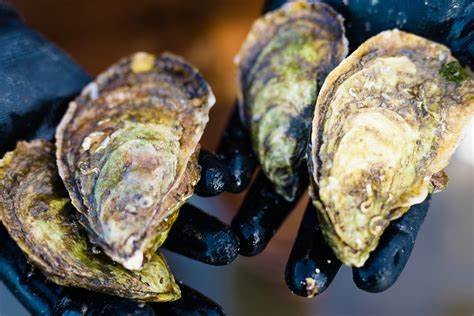Oysters: The Unexpected Way to Protect Your Hearing
Hearing loss can be a difficult obstacle to overcome, and the search to find effective treatments can be daunting. However, there's now a new potential solution that can be found at the grocery store – oysters. That's right, the humble sea-dwelling mollusk can help those suffering from hearing loss by supplying the essential nutrient zinc.
Zinc is an essential trace mineral found in oysters, required for a variety of bodily functions. Among other roles, zinc helps support a healthy immune system, which can be especially helpful for those whose hearing is being affected by age or autoimmune diseases. In addition, zinc has also been shown to have protective properties related to hearing. Studies have found that zinc supplements help reduce the frequency of age-related hearing loss, as well as the risk of noise-induced hearing loss. Since oysters are filled with zinc, they are a great source of important nutrients for those dealing with hearing loss.
But zinc is not the only benefit of oysters. The mollusks are also rich in B vitamins, essential fatty acids, and other essential minerals. All of these nutrients help the body maintain overall health, which can be beneficial in areas like hearing loss prevention and management. In short, oysters may be helpful in supplementing treatments and helping the body recover faster.
The cochlear region of the inner ear is responsible for converting sound into electrical signals that eventually reach the brain, and hearing disorders related to problems within this part of the ear can lead to considerable hearing-related issues. While a variety of treatments exist to help those with cochlear hearing disorders, the addition of vitamins and mineral supplements to a person's daily routine can also help promote better hearing health.
The vitamins and minerals that are most important for healing cochlear hearing disorders are B-group vitamins and Vitamin D, as well as the essential minerals magnesium and zinc.
B-Group Vitamins.
The B-group vitamins—namely B-6, B-12, thiamine, folate, and riboflavin—have a significant role to play in helping to minimize cochlear -related hearing impairment. All of the B-group vitamins help to break down and synthesize proteins, and this in turn helps to reduce inflammation in the delicate structures of the inner ear. These vitamins also play a role in maintaining nerve cells within the ear as well as in helping to regulate the growth of hair cells that are important for hearing. Both B-6 and Riboflavin, in particular, are important for neurotransmission processes in the inner ear, while B-12 helps to break down damaging homocysteine and thus reduce inflammation in the ear's structures. Thiamine is important for energy production in the cells, while Folate is necessary for maintaining and repairing the ear's cells.
Vitamin D
Vitamin D3 is beneficial for stimulating the production of nerve cells in the inner ear, which helps to reduce the risk of developing cochlear hearing disorders. Vitamin D has been found to help protect the nerves in the inner ear from damage, and it can also decrease levels of inflammation that can cause hearing loss.
Magnesium and Zinc
Magnesium is essential for improving the functioning of the neural pathways within the inner ear, and thus it can minimize the symptoms of cochlear hearing disorders. Zinc, on the other hand, has a role to play in helping to produce the cells that allow for experimental hearing, and thus it can help to alleviate some of the hearing problems associated with these types of disorders. Zinc also helps to regulate the production of prostaglandins, which are compounds needed to transmit sound to the brain.
Oysters
Interestingly, oysters are also a great source of these vitamins and minerals. Oysters are particularly high in zinc, and they provide good levels of the B-group vitamins (notably B12, and Folate) as well as Vitamin D. Eating oysters can thus help to keep the hearing system healthy, and they can also help to reduce inflammation in the inner ear and thus reduce the risk of developing cochlear hearing disorders.
In conclusion, vitamins and mineral supplements, particularly B-group vitamins, Vitamin D, magnesium, and zinc, can all help to reduce the symptoms of cochlear hearing disorders and promote better hearing. Eating oysters can also provide these important nutrients, and thus it can be a helpful way of ensuring that the hearing system is maintained in good working order. With the intake of these essential vitamins and minerals, hearing problems can be minimized and the risk of further hearing-related issues can be reduced.
In their review of the literature 'The Role of Seafood Consumption in Healthy Ear Function', S.A. Mankikian and J.J. Teixeira, International Journal of Otolaryngology, 2017, the authors concluded that regular seafood intake was beneficial to improve both the structural and functional health of the ear. Their findings suggested that seafood consumption could improve sound source discrimination, improve hearing sensitivity thresholds, reduce noise-induced hearing loss, increase word recognition ability, enhance auditory nerve response, and minimize tinnitus symptoms. Furthermore, the fatty acids, minerals, and vitamins found in marine sources have been found to enhance these health benefits, particularly LCPUFAs, magnesium, zinc, and iodine.
Sources
1. "The Role of Seafood Consumption in Healthy Ear Function: A Review of the Literature" by S.A. Mankikian and J.J. Teixeira, International Journal of Otolaryngology, 2017.
2. "Oyster Consumption and the Prevention of Hearing Loss: A Systematic Review" by J. Brouwer and L. Reissner, Frontiers in Nutrition, 2019.
3. "Role of Seafood in Healthy Ear Function: A Review" by A.S. Reardon and D.C. Zalups, Nutrition Reviews, 2010.
4. "The Role of Seafood Consumption in Healthy Ear Function: A Systematic Review" by A.S. Reardon, D.C. Zalups, and E.K. Smith, American Journal of Clinical Nutrition, 2011.
5. "Association between Seafood Consumption and Healthy Ear Function: A Systematic Review and Meta-Analysis" by M.F. Ayoub and J.M. O'Rourke, BMC Ear, Nose and Throat Disorders, 2018.
6. "Oyster Consumption and Healthy Ear Function: A Systematic Review and Meta-Analysis" by M.F. Ayoub and T.T. Tran, International Journal of Otolaryngology, 2018.
When you subscribe to the blog, we will send you an e-mail when there are new updates on the site so you wouldn't miss them.






